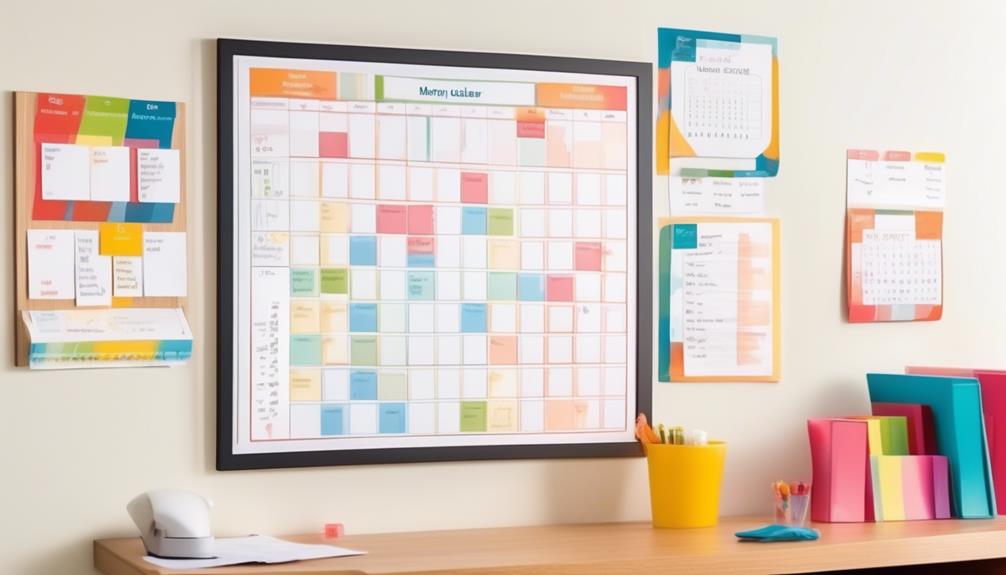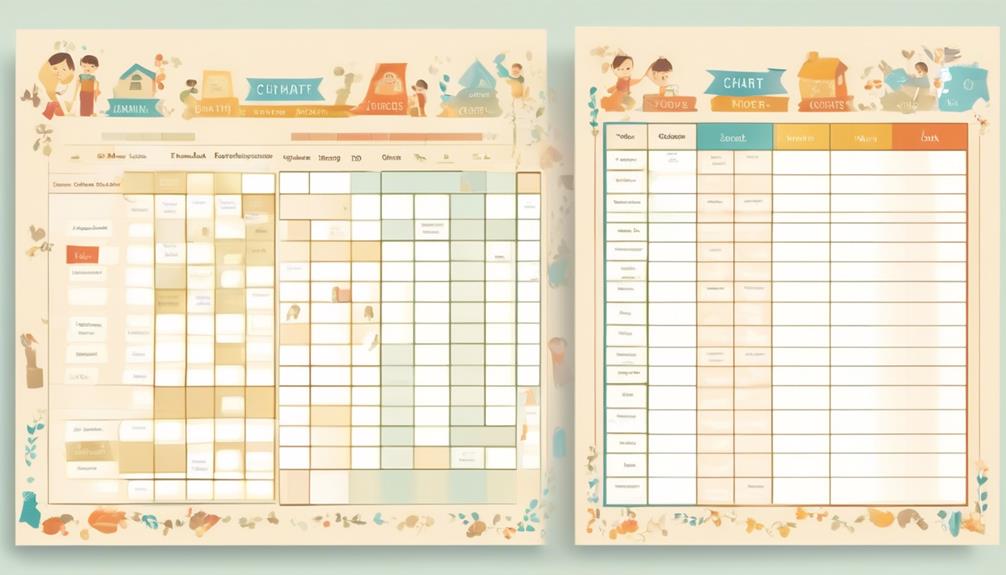Efficiently Sharing Household Chores With Your Family
This post may contain affiliate links which means I may receive a commission for purchases made through links. As an Amazon Associate, I earn from qualifying purchases. Learn more on my Private Policy page.
Striking a balance between managing household chores and spending quality time with your family can sometimes feel like an impossible feat. You find yourself caught in a perpetual cycle of tidying up after everyone, leaving you with little time to unwind and enjoy the company of your loved ones.
But what if there was a way to efficiently divide and conquer the tasks, allowing everyone to contribute their fair share while fostering a sense of responsibility and teamwork?
Setting Clear Expectations

To ensure that household chores are divided fairly and everyone understands their responsibilities, it's important to set clear expectations from the beginning. Clear communication is essential in this process. Sit down with your family members and have an open discussion about the division of chores. Clearly outline each person's responsibilities and make sure everyone understands the importance of their role in maintaining a clean and organized household. By openly discussing and setting these expectations, you can avoid misunderstandings and potential conflicts in the future.
In addition to clear communication, implementing an accountability system can further reinforce the expectations that have been set. For example, you can create a chore chart that clearly outlines who's responsible for which tasks and when they need to be completed. This chart can serve as a visual reminder for everyone in the household. To ensure that the accountability system is effective, it's important to regularly check in with each family member to see if they're keeping up with their assigned chores. This will help foster a sense of responsibility and ownership among all family members.
Creating a Chore Schedule
Consider creating a chore schedule to clearly outline when each task needs to be completed and by whom. A chore schedule can help with time management, ensuring that everyone in the family knows what needs to be done and when. It also helps in balancing the workload among family members, making sure that no one person is overwhelmed with too many tasks. By creating a chore schedule, you can establish a sense of accountability, as each family member will be responsible for their designated chores.
When creating the chore schedule, it's important to involve everyone in the process. This fosters collaboration and ensures that the schedule is fair and manageable for all. Sit down with your family members and discuss their preferences and availability. By taking everyone's input into account, you can create a schedule that works for the entire family.
To maintain balance and fairness, consider rotating chores on a regular basis. This prevents any one person from feeling burdened by the same tasks week after week. Additionally, it allows everyone to learn and contribute to different aspects of household management.
Remember to display the chore schedule in a prominent place in your home, such as the kitchen or a communal area. This serves as a visual reminder for everyone and encourages accountability. By creating and following a chore schedule, you can effectively manage household responsibilities while promoting a collaborative and balanced approach to maintaining your home.
Implementing a Reward System

When organizing household chores and ensuring fairness, it's essential to recognize and motivate the efforts of each family member by implementing a reward system that acknowledges their contributions. Motivating participation and encouraging teamwork are crucial aspects of this system. By offering rewards, you can create a positive atmosphere that motivates everyone to participate actively in household chores.
Rewards can be tailored to the preferences of each family member, making them feel valued and appreciated for their contributions. To motivate participation, consider setting up a reward chart where family members can earn points or stickers for completing tasks. These points can then be redeemed for rewards such as a movie night, a special outing, or a small gift.
This system not only motivates individuals to participate but also fosters a sense of teamwork as family members can work together to achieve common rewards. It's essential to ensure that the rewards are meaningful and desirable for each family member, as this will further encourage active participation.
Moreover, encouraging teamwork through the reward system can involve setting collective goals for the entire family. When these goals are achieved, such as maintaining a clean and organized home for a certain period, the entire family can celebrate with a special reward or activity. This approach promotes a collaborative effort and reinforces the idea that everyone's contributions are valuable in maintaining a harmonious household.
Utilizing Task Management Tools
You can streamline the allocation and tracking of household chores by incorporating task management tools into your family's routine. Maximizing efficiency in managing household tasks is essential for a well-organized and smoothly running home. With the help of digital organization tools, you can effectively assign, monitor, and complete chores in a more structured and efficient manner.
Task management tools come in various forms, such as mobile apps, online platforms, or digital calendars. These tools allow you to create task lists, set deadlines, and allocate responsibilities to each family member. By utilizing these digital resources, you can ensure that everyone is aware of their specific chores and deadlines, reducing the likelihood of tasks being overlooked or forgotten.
Moreover, these tools often provide features for progress tracking and reminders, enabling you to stay on top of household responsibilities without the need for constant verbal reminders. This fosters a sense of accountability and responsibility among family members while reducing the burden of managing chores solely on the parents.
Digital organization tools also offer the flexibility to make adjustments to chore schedules and assignments as needed. This adaptability is valuable for accommodating changes in family members' schedules or unexpected events, ensuring that household tasks remain consistently managed and completed.
Communicating Openly and Effectively

Incorporating task management tools not only enhances the efficiency of chore allocation but also lays a foundation for open and effective communication within the family. Improving communication within the family is essential for efficiently sharing household chores. By openly discussing responsibilities and expectations, each family member can feel heard and understood. Consider holding regular family meetings to discuss chore assignments and to address any concerns or suggestions. This fosters teamwork and ensures that everyone feels valued and included in the chore-sharing process.
To improve communication, it's crucial to express appreciation for each other's efforts. Positive reinforcement can go a long way in creating a supportive and collaborative atmosphere. Additionally, active listening is key to effective communication. Encourage family members to share their thoughts and actively engage in discussions about household chores. This not only promotes transparency but also helps in finding solutions that work for everyone.
Openly discussing challenges and finding compromises can lead to a more harmonious chore-sharing experience. It's important to approach conversations with an open mind and a willingness to understand different perspectives. By doing so, you can foster an environment where everyone feels comfortable expressing their needs and concerns.
Delegating Age-Appropriate Chores
Assigning age-appropriate chores to your children can help instill a sense of responsibility and contribute to their development. By teaching responsibility through chores, you can foster independence in your children. It's essential to consider your child's age and abilities when delegating chores. Younger children can start with simple tasks like putting away toys, making their bed, or feeding pets. As they grow older, they can take on more complex responsibilities such as setting the table, folding laundry, or helping with yard work.
Teaching responsibility through chores not only lightens your load but also equips your children with essential life skills. It instills a sense of pride and accomplishment in them, as they learn to contribute to the functioning of the household. Additionally, it prepares them for the future by teaching them valuable skills they'll need as adults.
Fostering independence in your children is another significant benefit of delegating age-appropriate chores. As they learn to complete tasks on their own, they gain confidence and self-reliance. This independence will serve them well as they grow and eventually venture out on their own. By delegating age-appropriate chores, you're setting the stage for your children to become responsible, independent, and capable individuals.
Establishing Consequences for Non-Compliance

When setting up consequences for non-compliance with assigned chores, it's important to establish clear expectations and communicate them effectively to your family members. Consequences provide accountability and are essential to ensure that everyone in the household understands the importance of fulfilling their responsibilities.
Consistency is key in enforcing consequences for non-compliance. Make sure that the consequences are applied uniformly and fairly to all family members, regardless of age or other factors. This consistency helps to create a sense of fairness and ensures that everyone is held to the same standard.
It's important to establish consequences that are appropriate for the specific chore and the age of the family member responsible. For instance, if a teenager consistently fails to complete their assigned chores, a consequence might involve restricting their screen time or other privileges. On the other hand, a consequence for a younger child might involve a temporary loss of a favorite toy or game. It's crucial to communicate these consequences clearly and ensure that everyone in the family understands the link between non-compliance and the resulting repercussions.
In order for consequences to be effective, they must be consistently enforced. If consequences aren't consistently applied, family members may not take their chores and responsibilities seriously. Holding everyone accountable through consistent enforcement of consequences ensures that each family member understands the importance of completing their assigned chores. By doing so, you can instill a sense of responsibility and accountability in your family members, leading to a more harmonious and cooperative household.
Reviewing and Adjusting the Chore System
To ensure the efficiency and fairness of your household chore system, regularly evaluate and make necessary adjustments to the assigned tasks and expectations. This ongoing review process will help ensure that the chore system remains effective and equitable for all family members.
Here are three key considerations when reviewing and adjusting your chore system:
- Chore accountability: It's important to assess whether each family member is consistently completing their assigned chores. If certain tasks are being neglected or not done to standard, it may be necessary to reassign responsibilities. Encouraging open communication and discussing any challenges or obstacles that may be preventing someone from completing their chores can also help maintain accountability within the household.
- Flexibility in assignments: As family dynamics and schedules change, it's essential to be flexible in adjusting chore assignments. Life transitions such as a new job, school activities, or health issues can impact a family member's ability to fulfill their responsibilities. Regularly reviewing and adjusting chore assignments based on these changes can help ensure that everyone's workload is fair and manageable.
- Revisiting expectations: Over time, it's important to revisit the expectations set for each chore. As children grow older or as circumstances change, the level of responsibility and thoroughness required for a particular task may need to be adjusted. This ensures that the chore system continues to be realistic and appropriate for each family member's abilities and stage of life.
Frequently Asked Questions
How Do I Handle a Family Member Who Consistently Refuses to Do Their Assigned Chores?
When handling a family member who consistently refuses to do their assigned chores, it's essential to communicate openly about the impact of their actions. Consequences for non-compliance can provide motivation, and finding a compromise is key to resolving the situation.
What Are Some Creative Ways to Motivate My Family Members to Participate in Household Chores?
To motivate your family to help with chores, consider using incentives like rewards or a team approach. This can encourage everyone to contribute and create a sense of teamwork and shared responsibility in the household.
How Can I Ensure That the Chore Schedule Is Fair and Balanced for Each Family Member?
To ensure a fair and balanced chore schedule, creating incentives and fair division is key. Acknowledge everyone's strengths and preferences, rotate tasks regularly, and communicate openly. Set clear expectations and show appreciation for each family member's contributions to keep the system running smoothly.
What Are Some Effective Strategies for Handling Disagreements or Conflicts Over Household Chores?
When handling disagreements over household chores, clear communication is key. Use conflict resolution strategies to address issues calmly. Negotiation and compromise are effective tactics. By working together, you can find fair solutions that satisfy everyone.
How Can I Encourage My Family Members to Take Ownership and Pride in Completing Their Assigned Chores?
Encourage your family to take ownership and pride in chores by offering positive reinforcement and effective communication. Emphasize teamwork and accountability to build a sense of responsibility and accomplishment within your household.
Conclusion
In conclusion, by setting clear expectations, creating a chore schedule, implementing a reward system, and using task management tools, you can efficiently share household chores with your family.
Additionally, communicating openly, delegating age-appropriate chores, and establishing consequences for non-compliance are important steps in creating a harmonious and cooperative household environment.
Remember to review and adjust the chore system as needed to ensure everyone is contributing and the workload is fairly distributed.
With these strategies in place, you can create a harmonious and cooperative household environment.
